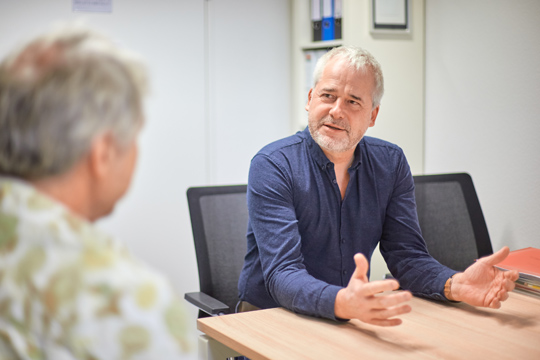“Just providing information is not enough”
Freiburg, Jan 17, 2020
Surveys show that 84 percent of Germans are willing to donate their organs – yet only 33 percent have an organ donor card. In fact, so few organs are actually donated that politicians are now struggling to find legal solutions. The German parliament has just voted on draft legislation proposed by Health Minister Jens Spahn, who has come up with an opt-out solution. The law would have made every person a potential organ donor – unless they expressly opted out during their lifetimes. Instead, the decision was made to intensify the current opt-in system. Dr. Klaus Michael Lücking, paediatrician and Medical Coordinator for Organ Donation at the Medical Center in Freiburg, spoke with Jürgen Reuß about what he regards as central to the issue of organ donation.
 The German parliament has passed new laws regarding organ donation. Organ donor ID is not yet a thing of the past; it is to be supplemented by an online register. Photo: Alexander Raths/stock.adobe.com
The German parliament has passed new laws regarding organ donation. Organ donor ID is not yet a thing of the past; it is to be supplemented by an online register. Photo: Alexander Raths/stock.adobe.com
Dr. Lücking, if we believe the results of surveys, four-fifths of Germans think organ donation is a good thing; but only about a third of the population carries an organ donor ID. What has your experience been in practice?
Klaus Michael Lücking: In practice the discrepancy is even more pronounced. Of the patients in intensive care units – where we have to talk to relatives about organ donation – less than five percent have an organ donor card or a living will.
Why is that?
Making a decision on this means dealing with the matter of your own death – the fact that one day, you will be no more. For most people, regardless of age, this is an emotionally charged issue. I can see why people find it very difficult.
How does the decision get made despite that?
As with any good decision, both rational arguments and emotional concerns have to be weighed up. As a community, as a state, we call on citizens to donate their organs – so we should also help to create opportunities for discussion, inquiry and consultation. People need to sit face to face with a person a competent in these matters – it is not enough to just provide information.
In your experience, which aspects absolutely need to be discussed?
First of all, there is one very important thing to bear in mind: no one comes to the hospital as an organ donor. Every person brought in here to the resuscitation room and the intensive care unit comes as a patient and it’s our primary aim to help them. First and foremost, it is our mission to do everything possible to save the patient if that’s what he or she wants. Only when there is no longer any hope can we think of ceasing intensive care treatment and about organ donation. And we must think about it – and talk about it openly.
What useful steps can one take during one’s lifetime or as a family member to prepare for making this kind of decision?
There are many good information brochures. But there are few people you can go to to really talk openly about your questions, your discomfort, your concerns. There is a need for such people. They could be family doctors, if they are properly trained and funded. They would be good contacts – not only for organ donation, but in general for decisions related to the end of life, such as living wills and health care proxy.
A person is considered dead when they are brain dead. You can’t see that from outside, while the heart is still visibly beating. Isn’t that uncanny for many people?
Life and death have many different dimensions – scientific, ethical, religious, spiritual. Yet many experts in ethics and philosophy, including the German Ethics Council, accept brain death as the death of a human being. It is interesting that the vote of the German Ethics Council also allowed a minority vote in which representatives of various fields said: No, for us brain death is not the death of human being, but it is a point of no return in the dying process – a moment that is irreversible, but it would be arbitrary to define this point as death. Nevertheless, we consider brain death to be so serious that we would agree to organ donation from that point on. The German Medical Association has revised the Brain Death Directive for good reason, and in the current new edition it no longer refers to brain death but to the irreversible loss of function of the entire brain.
 “Not everything that Medicine can offer has to be desired by the patient,“ says Klaus Michael Lücking. Photo: Harald Neumann
“Not everything that Medicine can offer has to be desired by the patient,“ says Klaus Michael Lücking. Photo: Harald Neumann
Doesn’t a certain feeling of unease still remain?
Yes, especially in the medical profession. According to a 2014 survey, 20 percent of a hospital team say they have problems with the brain death concept. This discomfort hovers in people's minds. Although they know what brain death means, they do not necessarily perceive the patient as dead. The organ donor card says “after my death..." For most people, this means “when I stop breathing, when my heart stops beating.” Several times, after public discussions about the concepts underlying the definition of brain death, people have come to me and said, “I have to turn in my donor card now. I thought, "dead" meant when I was "really dead."
Would you have been thankful if parliament had agreed to the opt-out solution – and the need for express consent and difficult discussions with families would have been minimized?
No, I would continue to talk to relatives. There is in the field of medicine a growing understanding for patient autonomy and I too have always been committed to it. The patient doesn’t have to want everything that medicine can offer. Certain interventions just aren’t possible if the patient does not agree. It was a long road away from the paternalistic attitude that the doctor knows what’s best for the patient, to involving the patient. It would be a paradigm shift if the introduction of an opt-out system meant that silence becomes consent to a relevant medical intervention. In the current discussion, I think that organ donation is narrowed down too much to the question of legal rules anyway.
What other factors are important?
The structure of the organ donation system, the resources in hospitals that are meant to make organ donation possible – or new paths such as organ donation after the end of intensive care treatment and cardiac arrest. In the UK, 40 percent of organs are donated in this way. And one more thing is very important – we don't think enough about the doctors and nursing staff who first have to treat patients with the aim of curing them, and then have to continue intensive care to enable organ donation. During organ removal, a patient appears to die on the operating table, which in other contexts is always the worst-case scenario. This does not necessarily become emotionally easier because brain death has been diagnosed beforehand. We doctors and nurses also have emotions, but usually nobody asks about them. Having the will of the patient clearly expressed, or sufficiently explained by relatives, is very important in enabling us to deal adequately with this stressful situation.

